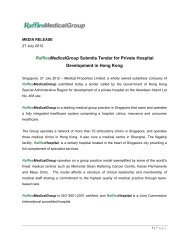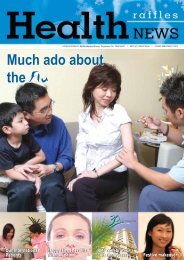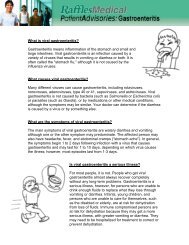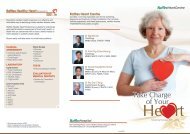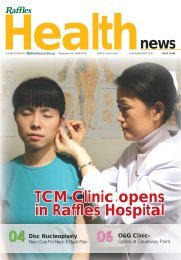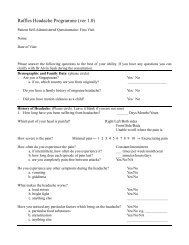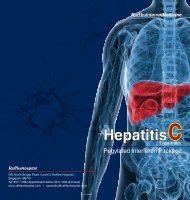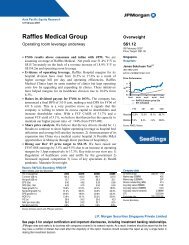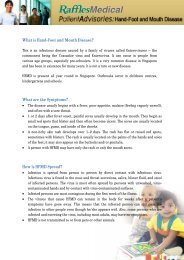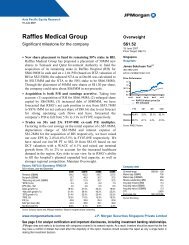Cancer You - Raffles Medical Group
Cancer You - Raffles Medical Group
Cancer You - Raffles Medical Group
You also want an ePaper? Increase the reach of your titles
YUMPU automatically turns print PDFs into web optimized ePapers that Google loves.
<strong>Raffles</strong> HealthNews Feature 13To understand cancer prevention,we must first recognise what puts usat risk. Dr Kelvin Thia, Specialist inGastroenterology & Consultant, <strong>Raffles</strong>Internal Medicine Centre, shares howeach of the following common risksfactors can pose as a threat.Risks1. SmokingSmoking has been linked tovarious types of cancer that includecancers of the lung, bladder,cervix, esophagus, liver, stomach,kidney, nasal cavity, etc. It is themost preventable cause of cancerand contributes to about 1/5 of allcancer related deaths worldwide.Saying ‘No’ to smoking is one ofthe most important decisions youcan make to lower your risk ofcancer. Do also avoid second-handsmoke.2. Unhealthy DietAs the saying goes, ‘you are whatyou eat’. Most of us love to eat andtend to indulge in unhealthy foodas they are tastier, more appetisingand easily available. Since whatwe eat goes into our body, it isimportant to exercise self-controland decide wisely on what goesinto our mouths. Here are someguidelines to consider:• Add more greens and beans -eat plenty of fruits and vegetablesas well as whole grains andbeans.• Reduce red meats – examples ofthese are pork, beef and lamb,in particular processed meats.They have been shown in largestudies to increase the risk ofcolon cancer. It is believed thatmeats cooked in high temperaturecan release carcinogens (cancercausing substance) in thegastrointestinal tract leading torisk of colon cancer.• Go easy on the fat - dietscontaining a high amount of fattend to contain a higher amountof calories and may lead tooverweight and obesity which canincrease cancer risk. A diet highin animal fat has been linked todevelopment of prostate cancer.Although recent larger studiesshow that eating more greenshas modest benefit in reducingthe risk of cancer, it is definitelysensible to include more fruitsand vegetables over red meatsand high fat content food giventhe other potential benefitssuch as weight reduction andcardiovascular risk.3. Poor Weight ManagementObesity has been associated withan increase in cancers such ascolorectal, postmenopausal breast,endometrial, renal, and esophagealcancer. Severely obese patientswho have successfully undergoneweight reduction through bariatricsurgery have a 60 percent reducedrisk of cancer when followed upover a period of an average ofseven years after the surgery.4. Sedentary LifestylePhysical activity has beenassociated with reduced risk ofcancers especially in colon andbreast, liver cancers. There aremany benefits in leading an activelifestyle even if weight loss is notachieved. For example in patientswith fatty liver (an increasinglycommon lifestyle disease) and arisk factor for liver cancer, clinicalstudies have shown that regularexercise even in the absence ofweight reduction can reduce liverinflammation in these patients.The possible factors behind thebenefits are the improved insulinresistance and a stronger immunefunction. As a general goal, tryto include at least 30 minutesof physical activity in your dailyroutine; e.g brisk walks, fitnessclass and swimming.5. Too Much AlcoholAlcohol intake even in moderateamounts increases the risk oforopharyngeal, esophageal,laryngeal, rectal, liver, and breastcancers. Risk also increases withthe amount one consumes over alength of time.6. Risky BehavioursMajority of viruses linked tocancers such as hepatitis B (liver),hepatitis C (liver), HIV (lymphoma),human papilloma virus (cervical,anal), are spread through contactwith infected blood or body fluids.Therefore, avoiding promiscuityand sharing needles can preventexposure to the accompanied listof infections. Vaccinations againstHBV and HPV are particularlypromising in reducing such risks.7. Prolonged Exposure to the SunIt’s not only about aesthetics,prolonged exposure to the sun notonly causes pre-mature ageing ofthe skin, but it also increases therisk of contracting skin cancer. Thisis one of the most common kindsof cancer and also one of the mostpreventable. Protect your skin withthese tips:• Don’t leave home without it– apply a generous amount ofsunscreen of SPF 30 or higherwhen you’re going outdoors underthe sun. Don’t forget to reapply asand when required.• Cover exposed areas – coveras much of your skin as possible.Clothing, such as long-sleevedtops or pants, made from tightlywoven fabric offer the best formof protection from the sun’s UVrays.• Protect your eyes – wearsunglasses that offer 100 per centUV protection and/or wrap-aroundshades that help to block UV raysthat can also sneak in from the side.



